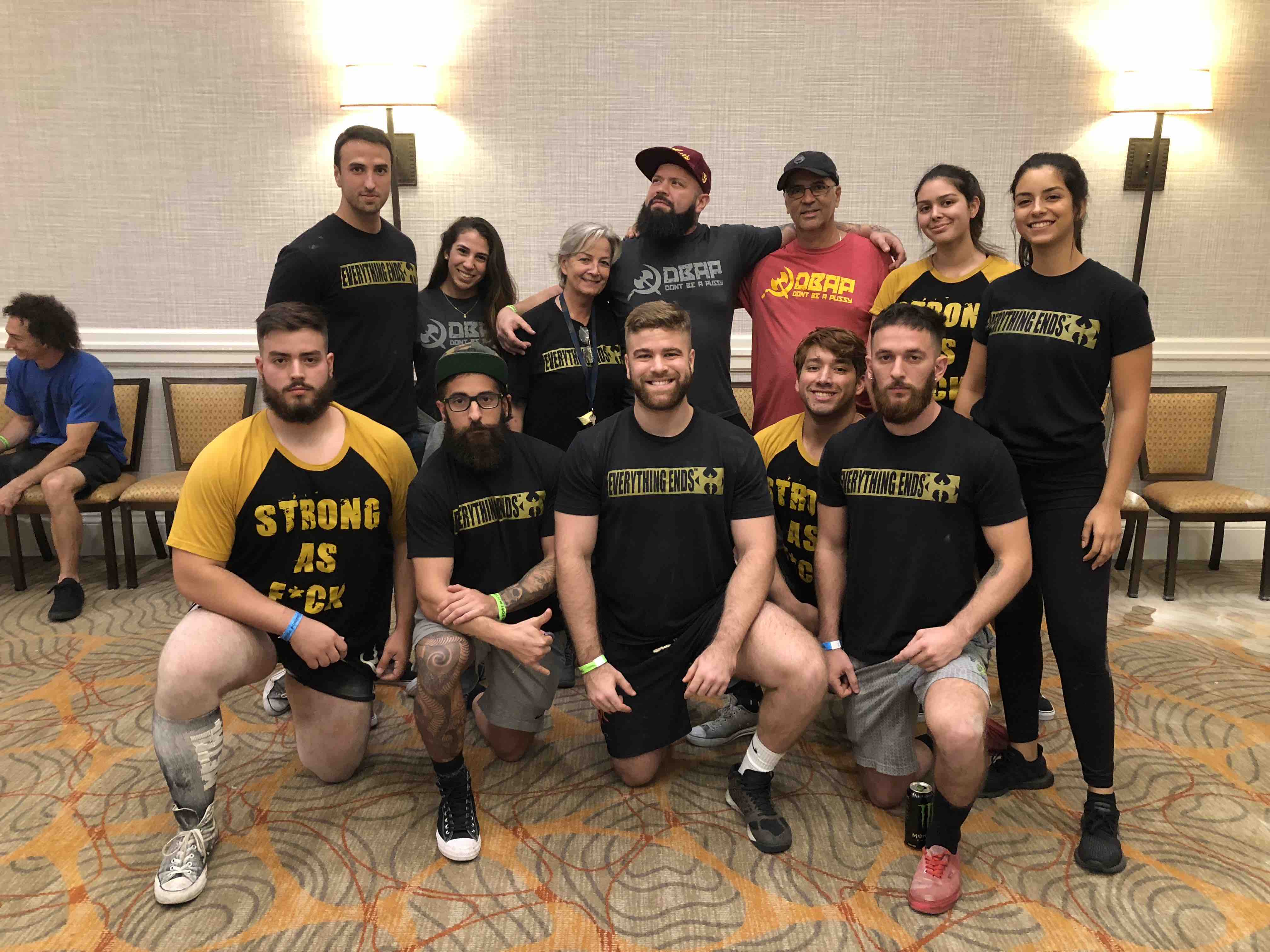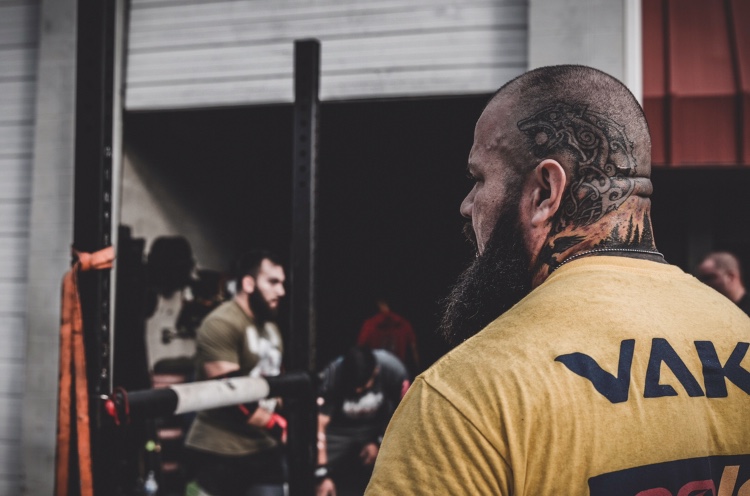
07 Dec Competition Day and the Mental Game
By Mike De La Pava “MDLP”
I have had the luxury of coaching several athletes in various disciplines, most notably Strongman and Powerlifting. Although the programming and troubleshooting of biomechanical issues are some of my favorites, nothing compares to standing by your athlete on competition day. I was recently asked by one of my lifters if there were any tips or cues on how to keep an athlete’s head in the game. My lifter is currently helping one of his friends out and will be handling him at a future meet, so he reached out to stay ahead of the game and see if I could offer any help. It took me a while to compress these ideas into a clear article, as dealing with the psyche of a lifter on game day is not only subjective, but it can be a roller coaster. After several cups of coffee and some evenings out on my balcony, I was able to pick my top 3 tips for honing in on an athlete’s mindset during competition. Keep in mind these are composed of not only my experiences but also my interactions with many, many great coaches over the years. These tips are heavily psychologically based (duh, it’s me), but have proven over time to be some of my major “go-to’s” during my checklist pre-comp day.
It’s not about you; it’s about the ATHLETE
Many coaches are guilty of trying to create their lifters in their image. We often influence them both on purpose and subconsciously. I am not saying it is wrong to pass on some of your traits, on the contrary, that’s one of the most beautiful aspects of coaching. Having mentioned that, I feel its important to remember that on competition day we need to let the athletes be themselves. If they are a calm athlete, so be it. If they like to pace some or listen to their favorite song, then let them. It’s not necessarily about making them run wild, but instead about fine-tuning their behavior and emotions. This concept is not unlike what you have been doing for 10-12 weeks with their body, on comp day, it is vital that you help dial in their mindset by allowing them to be at their most comfortable and confident. I’ve been guilty of and seen too many coaches try to make their lifters mimic them, all at the cost of the lifter’s comfort zone or confidence. The work has been done; the is the day to let your lifter shine and develop themselves. Don’t overdo it, fine tune and dial in the mindset. Remember, that was you back in the day.
Trust
I know this topic sounds easy, but we all know that is not the case. Coaching can be a very personal job and building a solid foundation of trust starts off the platform. If you have spent time building rapport, communication, and trust in with your athlete prior, then during comp day it should not be a significant issue. What I find can be the issue is the EXECUTION of trust. This subject goes both ways, but let us stay on the topic at hand. As the coach, there will come a time where the training wheels need to come off, and the athlete needs to go for it. The “do you think you have this” line can only go so far, and often I feel it puts more ‘nerves’ on the lifter. What I find to be tried and true is going in knowing that your athlete believes in what you will do and that you, as the coach, believe that your lifter came to execute. As mentioned above, this trust, built on open communication, and although most of this will be done before the competition, it is essential to maintain this rhythm on the day of competition. Talk to your lifter, comfort them, or psyche them up. All of these are just sub-categories that will help flourish the trust between coach and athlete making executing a lift or picking the winning deadlift that much easier.
Be Professional
For some of us, the lucky few, coaching is a paying gig, and acting professional may seem like common sense, but you’d be surprised. Whether paid or as a favor, a lifter has left their body and mindset in your hands as their coach and should be taken as an honor. I cannot reiterate this enough – ACT PROFESSIONALLY! I understand strength sports have an edge and no one is telling you to come in a suit and tie (although that’s awesome), but I am enforcing the actions that often go overlooked, or handled haphazardly. Be on time, have your notes, be awake, communicate, greet your lifters, find a space, have a team. These are just a handful of the actions a coach should be taking into account during completion day. Being there for the warm-ups, loading plates, assuring your lifter of warm-up times or events coming up may seem arbitrary but MASSIVELY overlooked by both new and seasoned coaches alike. This attention to details will absolutely help calm your lifter and keep their head in the game. If your athlete knows when, why and how they are going to lift they have very little else to worry about as you, and your team facilitates the minutia that revolves around a competition day: food, drink, chairs, chalk, ammonia, etc. Being professional closely ties into trust and both work hand in hand. A lifter cannot and will not develop confidence if a coach is late, not paying attention, or taking a competition day less serious than the athlete. Take into account that although this is for love and passion, it should not be treated as a game. The more professional and disciplined the coach is, the more FUN your lifter will have, and from my experience, an athlete having fun often outperforms everyone. Reread this one, I think it’s worth considering heavily.

These may only be a few of my favorite things (see what I did there) to execute during competition day. As both a coach and an athlete, I can’t emphasize enough the importance to have a checklist for yourself. Remind yourself of not only the physical demands of the day, and more importantly (I’d argue), the mental aspects that are to come. If you haven’t given these any thought, go ahead and add them to your list. Every coach, athlete, sport and generation has it’s own ‘set’ of cues and tips, and it’s imperative to keep these ideas evolving.
“Never Stray from The Way”
MDLP
To read more from MDLP and to follow his training and his gym, check out “The MDLP Scrolls,” his author page here at PRS. We here at PRS rely heavily on having a mental edge and if you’re interested in learning more, go grab a bundle of 10/20/Life 2nd Edition and Gift of Injury. Brian dives very deep into the mental aspect of training and competition.
Latest posts by Mike De La Pava (see all)
- MDLP: Training 8 weeks out - March 15, 2019
- MDLP: Deload week and Old Man Logan - March 6, 2019
- MDLP: Blood, Sweat and Flesh - February 28, 2019






Sorry, the comment form is closed at this time.